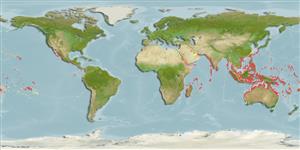Common names from other countries
>
Gobiiformes (Gobies) >
Gobiidae (Gobies) > Gobiinae
Etymology: Istigobius: Greek, istios = sail + Latin, gobius = gudgeon (Ref. 45335).
More on author: Herre.
Environment: milieu / climate zone / depth range / distribution range
Ecologia
marinhas associadas(os) a recifes; intervalo de profundidade 1 - 25 m (Ref. 90102), usually 1 - 18 m (Ref. 27115). Tropical; 23°C - 29°C (Ref. 27115); 30°N - 40°S
Indo-West Pacific: Persian Gulf (Ref.80050) and Red Sea to Samoa, north to Taiwan, south to Lord Howe Island.
Tamanho / Peso / Idade
Maturity: Lm ? range ? - ? cm
Max length : 13.0 cm TL macho/indeterminado; (Ref. 2798)
Espinhos dorsais (total): 7; Raios dorsais moles (total): 10-11; Espinhos anais 1; Raios anais moles: 9 - 11; Vértebras: 26. Color highly variable, brownish on upper half, grading to white below; dark brown scale margins forming honeycomb pattern and midlateral row of double dark brown spots forming rectangular markings (Ref. 90102); segmented and non branching caudal rays 3 (rarely 2), branching 14 (rarely 15). Predorsal cycloid scales 7-10, trunk ctenoid. Few with no black spots on nape. Isthmus narrow, scaled forward to vertical at posterior part of preoperculum. 2 diagonal, dusky lines on operculum; an inverted U-shaped spot prominent at the distal end of upper jaw. Pectoral fin with small dusky spots; 2 longitudinal lines on pectoral base spreading onto it fin rays. Sexual dimorphism exhibited in anal, pelvic and 2nd dorsal fin (Ref. 420).
A common species that inhabits areas of coralline sand of clear lagoon and seaward reefs (Ref. 9710, 48637). Found singly. Minimum depth from Ref. 58018.
Life cycle and mating behavior
Maturidade | Reprodução | Desova | Ovos | Fecundidade | Larvas
Genital papilla of male sometimes darkly pigmented and reaching to side of anal spine. Female genital papilla truncate, ending well before origin of anal fin.
Murdy, E.O. and D.F. Hoese, 1985. Revision of the gobiid fish genus Istigobius. Indo-Pac. Fish. (4):41 p. (Ref. 420)
Categoria na Lista Vermelha da IUCN (Ref. 130435)
CITES (Ref. 128078)
Not Evaluated
Ameaça para o homem
Harmless
Utilização humana
Aquário: Espécies comerciais
Mais informação
ReferênciasAquaculturaPerfil para aquaculturaEstirpesGenéticaElectrophoresesHereditariedadeDoençasProcessamentoMass conversion
Ferramentas
Relatórios especiais
Descarregue XML
Fontes da internet
Estimates based on models
Preferred temperature (Ref.
115969): 24.6 - 29.3, mean 28.3 (based on 3616 cells).
Phylogenetic diversity index (Ref.
82804): PD
50 = 0.5010 [Uniqueness, from 0.5 = low to 2.0 = high].
Bayesian length-weight: a=0.00891 (0.00535 - 0.01484), b=2.92 (2.78 - 3.06), in cm Total Length, based on LWR estimates for this species & (Sub)family-body (Ref.
93245).
Nível Trófico (Ref.
69278): 3.4 ±0.4 se; based on size and trophs of closest relatives
Resiliência (Ref.
120179): Elevada, tempo mínimo de duplicação da população menor que 15 meses (Preliminary K or Fecundity.).
Fishing Vulnerability (Ref.
59153): Low vulnerability (10 of 100).
